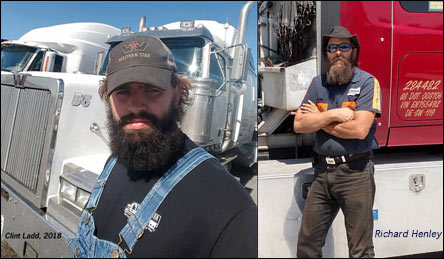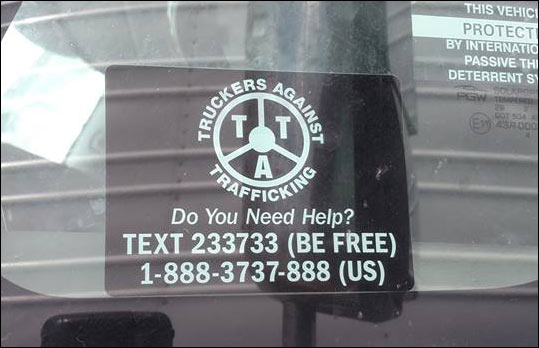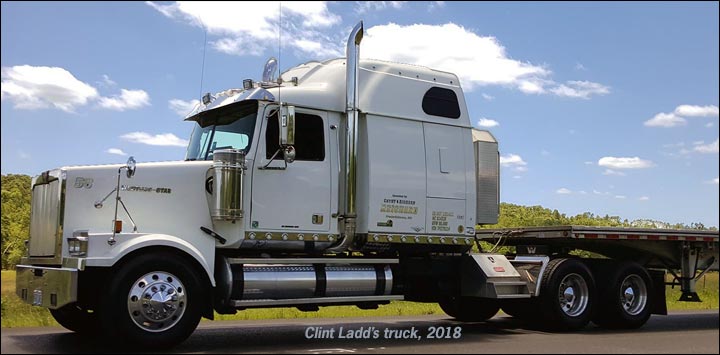
Long-time driver Richard Henley brought a small group of skilled, experienced drivers together to talk about their side of a Washington Post story on the current state of trucking. Before we jump into the questions, let’s review the credentials of everyone on the panel.

Richard Henley returned to full-time trucking when he bought a used Peterbilt 387 in 2010; he drove it for Prime until last year, when it swallowed a cam bearing, and replaced it with a 2014 ProStar powered by a Maxxforce engine. A member of the Owner-Operator Independent Drivers Association, he has been a member of the Prime Gold Millionaire club for over a million safe miles, and has won over a dozen other safety awards.
Clint Ladd started driving in August of 2010, when he was 23; he got his own truck and trailer the following year, and continues to drive it. He has been an owner-operator for most of his career, has a one-year safety award with Prime, and qualified for a state truck driving competition (but left before the competition started). He garnered four years of safety awards from Mercer Transportation before leaving the company.
Kari Fisher has been out with her husband Lee for 9 years. She wrote, “I may not drive, but I breathe diesel.” She is in the Owner-Operator Independent Drivers Association and Women in Trucking (WiT); she is also Truckers Against Trafficking certified, and has won a Making a Difference Award. Kari is the founder of the 71,000-member Missing Driver Network; and her husband has received safety awards.
All three drivers are supporters of Truckers against Trafficking.

Our first topic is…
Would you recommend trucking as a career?
Richard: I would recommend the career choice, reluctantantly. It’s getting tougher out here, what with most of the truck-stop chains wanting to rape their captive market, and with more and more regulations created to solve problems created by previous regulations made by people who didn’t have any idea what they were regulating. I guess, though, that things run in cycles; and listening to my grandfather and father and their trucking friends, it was getting that way in the late 1960s and early 70s, and things reversed and got better after the trucker strikes.
If you’re in a position where having a CDL [commercial driver’s license] is beneficial, you can’t beat the programs offered by some of the larger carriers. If you live in an economically depressed area where the good jobs are only paying $20k/year, you’ll do a lot better than that if you work hard, mind your expenses, and keep your safety attitude straight.
Like anything, read carefully before you sign on the line, and make sure it’s the right choice before you commit yourself. Home time is probably the hardest part, though I guess it is better than the military.

Clint: I am hesitant about referring people to get in trucking. I take into consideration if they are family/home dependent, but I also try to point out many different types of trucking that might fit them. I don’t think that it is a job for everyone; it’s definitely not Smokey and the Bandit.
I don’t believe that we are treated as badly as many drivers make it out to be. Some drivers bring their treatment on themselves, with a bad and impatient attitude.
I come from a trucking family; my dad drove when he was alive, and my mom and stepdad are still trucking, and on top of that I married into a trucking family. Needless to say, I followed in some footsteps. I still have a passion for nice trucks, and it still puts a smile on my face when I do something that is said can’t be done.
Kari: Being a professional driver can be rewarding. We’ve been places and taken loads places most drivers never have thought about. We’ve delivered steel for new buildings, and pivots to farms, museum displays, and concert tours. Everything is in a truck at some point in time. We are making a bucket list so we can return to places we passed by and smell the roses.
I wish the ATA would invest in a campaign to help make American roads safer and get training material (DMV manuals or commercials) out so that the people driving around trucks would know how to “share the road” safely.
Stay tuned for our next segment, as we talk about the driver shortage and how much drivers are paid — do they really get $80,000 per year?

Leave a Reply